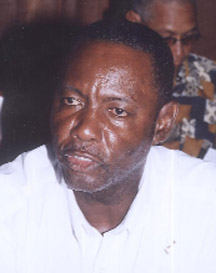General Secretary of the Guyana Trades Union Congress (GTUC) Lincoln Lewis says that the invitation by the Private Sector Commission (PSC) to the Leader of the Opposition, who is also Leader of APNU, David Granger, ignores the fact that the achievement of the budgetary cuts “were not singularly done by APNU.”
Lewis emphasized that the budgetary cuts “would not have been possible with APNU alone and most importantly were not even initiated by APNU.”

In a statement yesterday titled ‘Political and Social Partnership Engagement’, the GTUC general secretary maintained that any discussion of the impact of these budgetary cuts or efforts to help the nation understand and appreciate the said cuts “should not be done at the exclusion of the AFC and should also take on board all major stakeholders.”
Moreover, Lewis asserted that the GTUC will be monitoring very closely APNU’s response to the PSC, “whether it meets with the PSC in combination with the PPP or with the PSC as a separate stakeholder.”
Lewis said further that any discussion, agreement or negotiation emanating from any meeting in its proposed format will be seriously scrutinized as well as the participants.
“This nation and those who give the opposition its strength must ensure that the gains they fought for in the 2011 are not eroded by PPP subterfuge, (and) it is our right and responsibility to do so,” Lewis affirmed.
He had earlier referred to the May 6 Stabroek News article headlined, ‘Granger plans to meet PSC on concerns over budget cuts’ in which Granger was reported as saying that “he has agreed in principle to meet the Private Sector Commission (PSC) over its concerns about the $21 billion budget cuts but intends to take its request to the executives of the APNU before confirming.”
The GTUC, Lewis said, wishes “to make its position and concerns known since the PSC has specifically requested that the meeting be held among APNU, themselves, the government and the PPP.”
According to Lewis, “in the eyes of the public this may be perceived as an act to bring the APNU and PPP together in negotiation and dividing the opposition.”
He also pointed out that the cuts on the budget were the acts of the combined opposition with the support of their constituents.
“The budget and its cuts hold the interest of all in society, including labour, and the AFC. It is timely and significant in a society where government has lost all sense of reasonableness and ignores demands for good governance and accountability of the nation’s financial resources,” Lewis contended.
He also suggested that it would therefore be most prudent for the Leader of the Opposition to convene such meetings with a view of determining a way forward relative to the decisions taken. It is important to ensure that the people’s resources are managed in a way that would restore good governance and accountability.
Lewis insisted that the government has shown its hand that its strategy to manage the affairs of the state “will continue to be efforts to divide and rule, to plunder, exploit, and misrepresent issues in the hope of escaping accountability.”
In that light, Lewis said further, the “PSC’s effort to engage the government and APNU and/or the Leader of the Opposition with the non-involvement of the AFC and other stakeholders, would be an act of giving assent to a politics of divide and rule that has disregarded laws and principles, devastated this country, undermined peaceful co-existence and equitable development.”
The Leader of the Opposition in the new parliamentary dispensation, Lewis noted, has the opportunity to influence positive changes and success of the combined opposition in restoring accountability and governance.
“This has to start by respecting the foundational and supreme law of the land, the Constitution; universal declarations and international conventions, which give meaning to our existence as a nation and our relationship with each other in achieving the goals set out in these instruments that we subscribe to.” Lewis noted further that “the position of Leader of the Opposition is a constitutional one that requires representing issues on behalf of the society, which includes consulting with the AFC, labour and other stakeholders on matters that will affect their wellbeing.”
The GTUC general secretary pointed out that in accordance to the International Labour Organisation (ILO) tripartite structure, labour, employer and government sit as equals at the decision-making table to deliberate on societal matters, and the PSC is representative of the employer.
Lewis recalled that this is a mandatory relationship established since 1966 when Guyana joined the ILO. However, he charged that “under the Jagdeo leadership this tenet was treated with contempt for the first time and labour holds the new parliament accountable to bringing an end to such violations, promoting greater consultation as per constitution and international agreements, and promoting an environment of transparency.”
He also argued that the combined opposition in tandem with the cabinet must ensure that the articles of the Constitution that speak to these relationships are upheld and treated as sacred
Moreover, Lewis stressed that the recent budget cuts voted for by the combined opposition would best be discussed in an open and transparent atmosphere where all major stakeholders can air their concerns.




